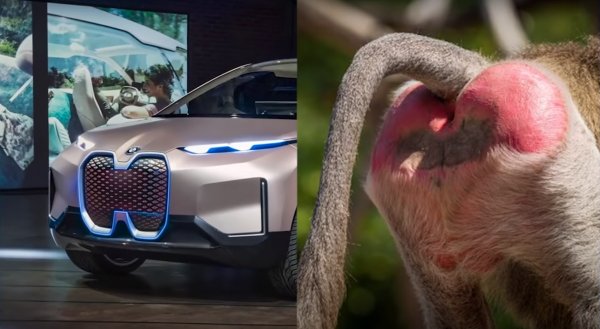|
|

BMW 2022

Now it's happened, even Americans are laughing at BMW's new front design, here using the example of the iNEXT and a baboon butt specially selected for this picture. You can find the video for this below. Take it as a gag
while we use it as an introduction to a more serious subject. By the way, there are already offers to retrofit the radiator grille on the still relatively new cars.
It's about electric cars, no, not this time, how you first co-founded a trend and then ignore it for years. We already had that. But the company, which otherwise relies on dynamism, has also clearly lost this when making
decisions about the future. The strange statements made in mid-2019 by former Chief Development Officer Klaus Fröhlich about a profound lack of customer inquiries for purely battery-powered vehicles could perhaps be
ignored as a drastic misjudgment if necessary.
But now his successor also said in an interview from auto motor sport that they don't really want to come up with a 'New Class' of electric cars not before 2015. In the same newspaper, his former boss at Opel, Professor
Indra, describes him as having a particularly affinity for electrical engineering during the Ampera era. Do you lose such beliefs when you successfully switch to the Munich four-cylinder?
A certain ignorance of one's own work history or sheer cheekiness seems to lie in the choice of the headline in addition to the ultra-late date. The 'New Class' was the name given to the 'birth by forceps', in the early 1960s, of
a of a mid-range car which, under the pressure of events, was known to have to be sold far too early. Accordingly, it had many errors and they had to be painstakingly corrected, not only in the construction.
In addition, it competed at a not really much lower price as 1500s against a comparatively large Mercedes 190 in many sophisticated variants. Only its modernity, e.g. with a new type of rear axle, and the name BMW probably
made it presentable. It was a courageous act in the early days. Daimler was suddenly more than four years behind in an important detail. But it is well known that great need gives wings.
Of course, BMW is a long way from that at the moment. One is comparatively rich, pat yourself on the back and, based on your own statistics, describe yourself as a kind of 'German champion of electromobility'. Of course, all
these disastrous hybrids, which are probably bought because of unfortunate subsidy rules, have also been counted. The new German transport minister is making people sit up and take notice, although he has yet again
backed away from his clear recommendation of electromobility for cars.
So if potential BMW customers are now even more looking for an electric car, you have exactly two BMW models to choose from, the i4 from € 59,200 and the X1 from € 67,300. They will not seriously consider the i3, which
has been built relatively unchanged since 2013, because its end has probably been decided without a direct successor. Anyone who no longer buys a car with a combustion engine because of a lack of future will not choose
an i3 either.
But that's not all, because BMW can hardly meet the demand for i4 and X1 at the moment, despite the high prices and thus lower subsidies. At the end of 2021, CEO Oliver Zipse prepared customers for the fact that they
would have to wait a few months (!) longer for the two new electric models. It is therefore not to expect a discount in the sales talk, but an even longer delivery time.
Somehow, Development Director Wagner is right when he describes the strategy of the three waves at BMW: The first wave was countered with i3 and i8 and for the second one relied on the flexible model of manufacturing
electric and combustion models on the same production line. However, this does not work without the storage of appropriate assemblies that you do not manufacture yourself. In this way, it will by no means be possible to
react more quickly to changes in demand. And therefore, the third wave seems to be developing like a tsunami at BMW.
There is still a debate as to whether electric mobility on platforms for combustion engines does not have serious disadvantages. At the same time, BMW is in deepwater that it doesn't matter on which platform as many purely
electric vehicles from BMW as possible, including those that are a little cheaper, should appear as soon as possible. There's talk on the internet about GM's imminent death. Check out what the people in US think about
BMW's contribution to electric mobility in the video below.
The new German federal government would like to have 15 million pure electric cars by 2030. If BMW doesn't publish its plans until 2015, it's unlikely that you'll get a piece of this pie. And we thought that Toyota was very late.
And another one. Maybe you can still switch to modern electric motors, even though one has just 'improved' them. Because, for example, doing without rare earths such as neodymium at the expense of wearing parts such
as brushes and slip rings to the rotor (picture above) means replacing slightly outdated technology with even older technology, not worthy of a company like BMW.
| Ever heard of reluctance motor? No, please do not imitate Tesla, what is meant is real reluctance. |
| Spanish subtitles possible . . . |
|
|